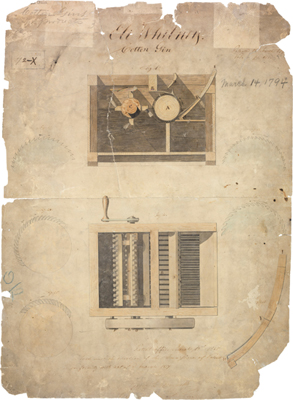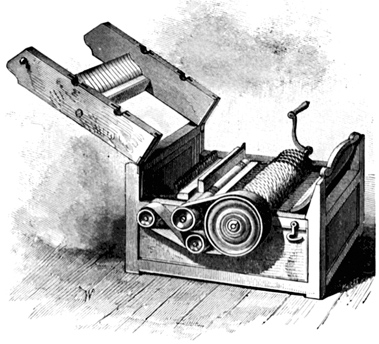 An invention can be so valuable as to be worthless to the inventor. Eli Whitney came to this conclusion because of the financial failure that was the cotton gin. Whitney gained fame and notoriety from his invention but did not gain the wealth he had anticipated.
An invention can be so valuable as to be worthless to the inventor. Eli Whitney came to this conclusion because of the financial failure that was the cotton gin. Whitney gained fame and notoriety from his invention but did not gain the wealth he had anticipated.
The cotton gin is a mechanical device that removes seeds from cotton. Before the invention of the gin, seeds had to be removed by hand. The cotton gin was a wooden cylinder with wire teeth. The teeth grabbed the cotton fibers and pushed them through a grate. The seeds were too large to fit through the grate so they were pulled away from the fibers. Whitney’s cotton gin could clean about 55 pounds of cotton a day.
The invention of the cotton gin changed the cotton industry in the United States. Whitney gave a one-hour demonstration of his new invention and farmers were ecstatic. They could now plant green seed cotton and remove the seeds much quicker and effectively.
Whitney did receive a patent for his cotton gin on March 14, 1794. This patent would later be numbered as X72. Whitney and his partner, Phineas Miller, did not actually intend to sell their product. They were planning to charge farmers for the service of cleaning the cotton. Their large price, two-fifths of a farmers profit, paid in cotton was the beginning of their financial problems.
 The simplicity of the cotton gin allowed for the device to be easily copied. The basic design could be built without the need for a model or measured drawings. Companies and individuals who built their own gins did not pay Whitney his patent royalties.
The simplicity of the cotton gin allowed for the device to be easily copied. The basic design could be built without the need for a model or measured drawings. Companies and individuals who built their own gins did not pay Whitney his patent royalties.
Whitney and Miller took the makers of the pirated versions of the cotton gin to court. A loophole in the 1793 patent act kept them from winning any of the law suits. As they watched the financial failure of their cotton gin, the partners began to license the making of cotton gins at a lower price. The state of South Carolina agreed to purchase the patent rights for $50,000 but never paid. Deals were also made with other southern states. Unfortunately, any profit made was spent on legal battles.
It was 1807 before Whitney’s patent was upheld in court. By then, Whitney had left the south discouraged by the failure of his invention. He never patented another invention.
Whitney is famous for the cotton gin but he was also instrumental in changing American manufacturing. He began the idea of mass production by producing interchangeable parts for use in arms manufacturing.
